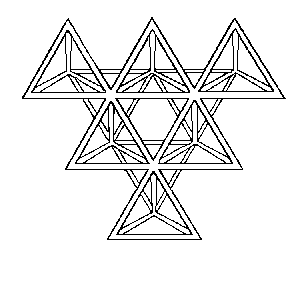
Return to Mark/Space
Molecular engineering, molecular technology, molecular machines, nanoengineering, nanotech, nanobots, assemblers.
"Thorough, inexpensive control of the structure of matter based on molecule-by-molecule control of products and by-products, the products and processes of molecular manufacturing, including molecular machinery". --K.Eric Drexler (in Unbounding the Future , 1991).
"The study of matter and computers at the level of one billionth of a meter. Dr Eric Drexler gave the field its name. Nanotech promises to stack and unstack matter a molecule at a time. In contrast microtech works at the level of a millionth of a meter with large blobs of molecules even in the smallest microprocessor. Some nanotech visions include viral-type swarms of smart nano-robots or nanobots that can clean teeth or kill cancer cells or build complex machines". --Bart Kosko (in Fuzzy Thinking , 1993).
"Nanotechnology could have more effect on our material existence than those last two great inventions in that domain: the replacement of sticks and stones by metals and cements, and the harnessing of electricity". --Marvin Minsky.
"The most radical of the green visions." --Terrence McKenna (writing in the Whole Earth Review ).
"Using the medium of virtual reality with molecular modelling software, it is possible to design submicroscopic components and assemblers. And if they can be designed, then you can bet that it won't be long before such devices are actually built.
"Nanotechnology will profoundly affect our perception of matter and the nature of 'reality'. When we are able to construct any physical thing using an invisible technology, it will be as magic. This is truly the stuff of gods.
"There is hardly an aspect of our civilization which will remain unchanged by nanotechnology. Gone will be the grossly polluting factories of the industrial era. No longer will we need to chop down trees, slaughter animals, or harvest plants. Swarms of submicroscopic nanomachines (or nanites) will roam inside our bodies repairing damaged cells and tissues, promising extended life spans.
"And from our rubbish we will build the necessities and the luxuries of daily life. Drexler foresees many products being built from one of the most durable forms of carbon... thus ushering in 'The Diamond Age'.
"But beyond all these remarkable physical changes will be the dramatic transformation of society itself. 'The Diamond Age' will make poverty a ludicrous concept. Terms such as 'power', 'wealth', 'nature', and 'human' will have to be redefined. New social organizations and safeguards will need to be developed." --Henry W.Targowski (in Mark/Space , 1995).
"The technology underlying cell repair systems will allow people to change their bodies in ways that range from the trivial to the amazing to the bizarre. Such changes have few obvious limits. Some people may shed human form as a caterpillar transforms itself to take to the air; others may bring plain humanity to a new perfection. Some people will cure their warts, ignore the new butterflies, and go fishing". --K.Eric Drexler (in Engines of Creation , 1986).
Definitions of nanotechnology
(listed at the Nanothinc website)
Engines of Creation by K.Eric Drexler
(complete text of this book available online... thanks to Russell Earl Whitaker)
Foresight Institute
(founded by K.Eric Drexler and Chris Peterson, e-mail: foresight@cup.portal.com)
K.Eric Drexler
(Anachron Library entry... bibliography of Drexler's work)
Nano! by Ed Regis
Nanotechnology Books
Nanotechnology on the WWW
1995 Nanotechnology Conference
Ralph C.Merkle's ftp site
(Anachron Library entry... publishing information, synopsis of book...
"Fascinating account of how the concept originated and developed. Recommended" --Henry W.Targowski.)
(Anachron Library entry... extensive booklist, non-fiction and fiction... plus many more links to other nanotechnology websites)
(web links)
(conference web page... for the latest schedule and abstracts... uncertain if temporary site)
(opens with a brief essay on the topic... worth a read)
